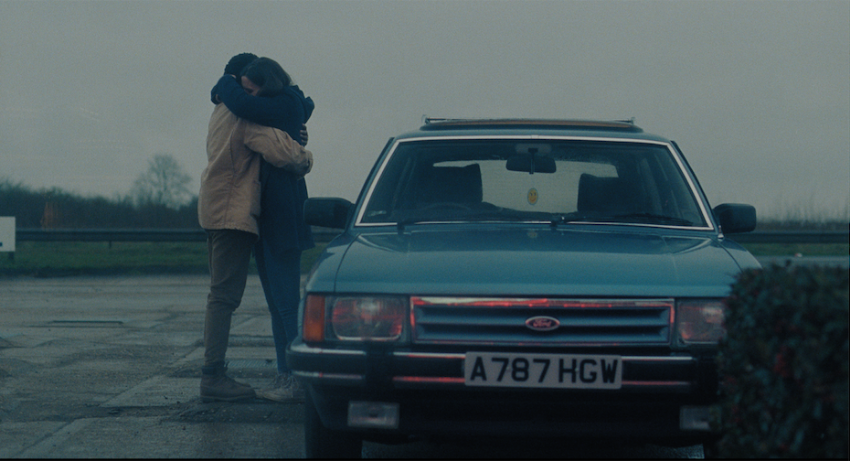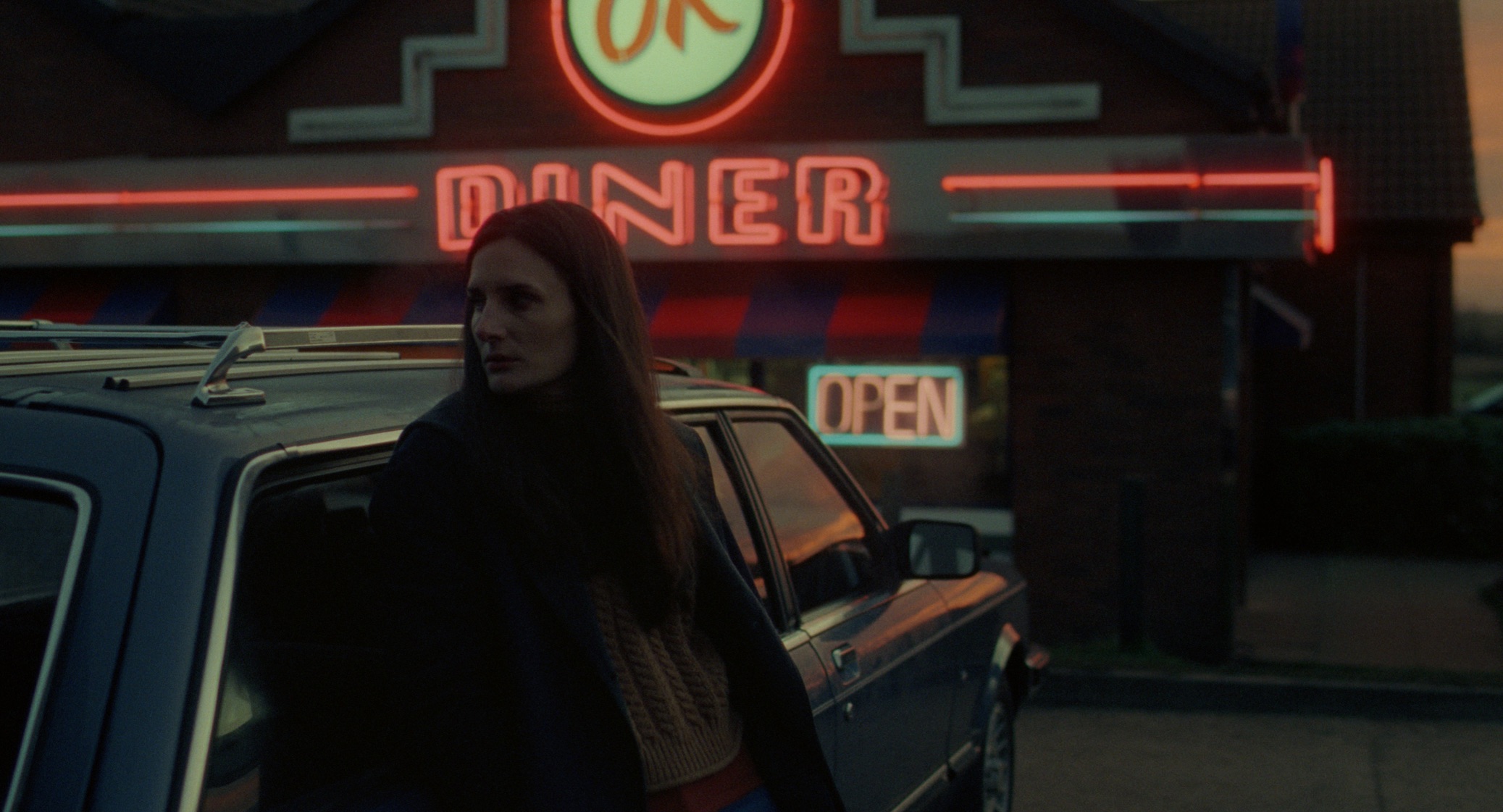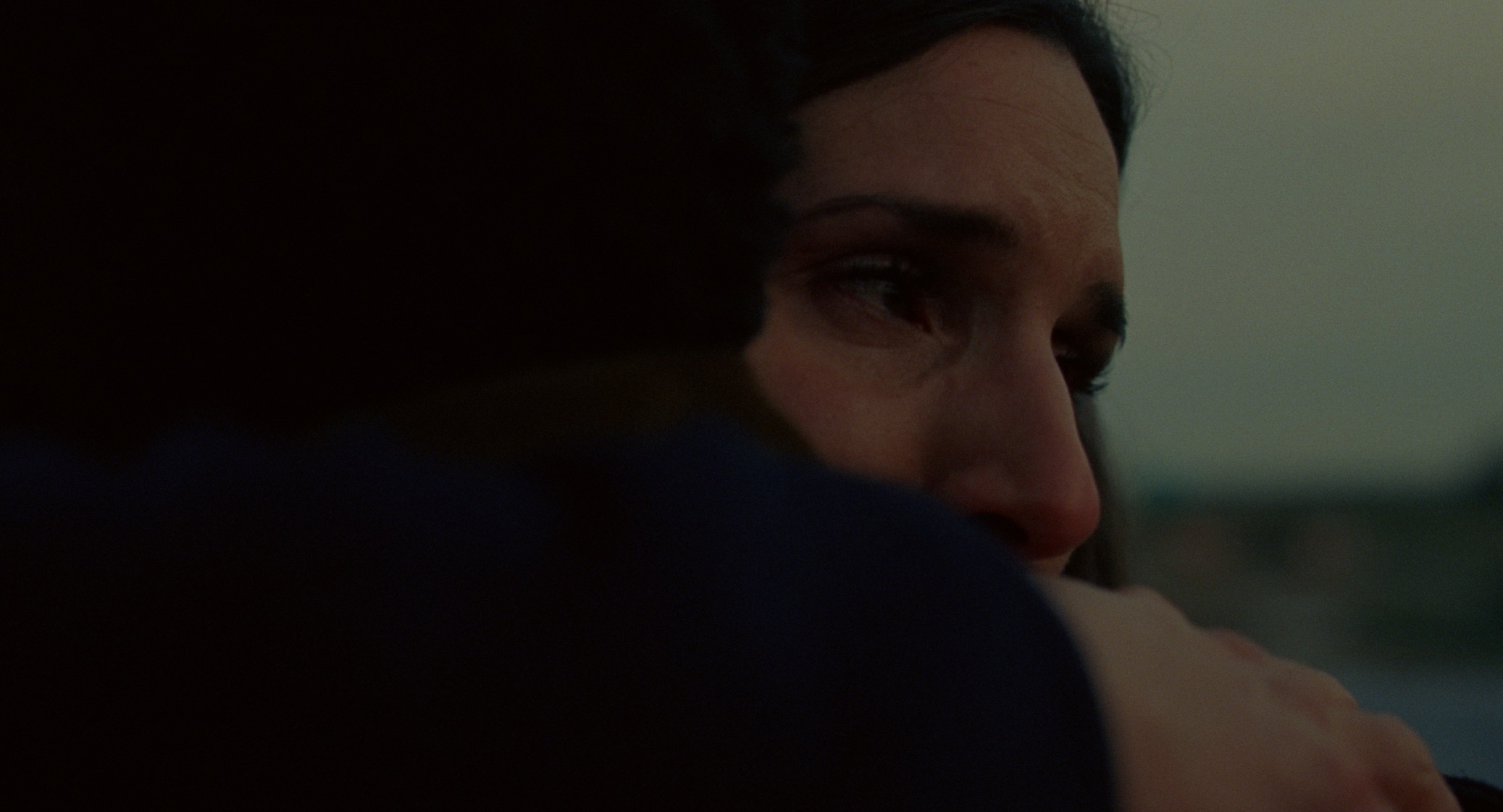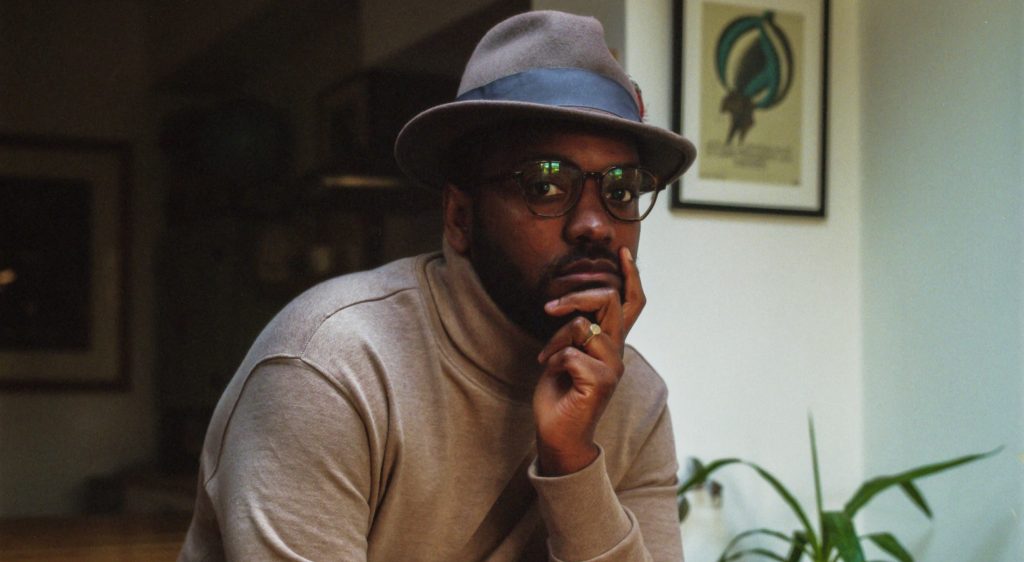Shaun James Grant is a director and filmmaker behind the short film “Hope”.

Set to be screen at this year’s Crystal Palace International Film Festival, “Hope” sees a young couple (portrayed by Yann Gael and Jane Dowden) stop at a diner in the early hours of the morning.
While there, it becomes apparent as to what they are dealing with, as it’s revealed that their child has gone missing.
Here at CelebMix, we got to speak to Shaun to find out a bit more about “Hope”.
Hi Shaun! How does it feel that “Hope” is out there in the world and will be screened at the Crystal Palace International Film Festival?
“I think this last year’s been quite hard, in terms of making work and people not seeing it, and that runs right the way through from the sort of level that I am at, just making this film right the way through to the other end in this industry.
“Everyone is kinda feeling similar things in that regard, we just want people to sit and watch our work. I know Crystal Palace aren’t actually doing their festival until that’s allowed, which is quite a nice feeling, it’s gonna be good and it’s quite close to me in terms of where I live. It’ll be nice to just go down there and sit down in the cinema and actually watch it in a cinema. First time I get to watch it in an actual screening room.”
What was the main inspiration behind “Hope”?
“In terms of how the film got started, it was the location that came first, it was sort of me travelling up and down the country. I used to see that actual diner at the side of the road when I was a kid, when I used to visit my dad in London, I grew up in Sheffield.
“As an adult, travelling from London to Sheffield, same thing, I used to see it, by that point I was a director, I found the diner a bit interesting, I was wondering, ‘Oh, who goes there? Who lives there? Where are they going? What’s their story?’
“And that kinda just lead into the idea of the film and then to fold on top of that, for me personally, it was about imprinting my paternal fears into the film, and from there it kinda grew a life of its own in that regard.
“I think that was the main source of emotional inspiration for me, the paternal aspect, as I’m quite recently a father myself. The first year and a half of being a parent was like a massive change in circumstance, you grow to love something else more than you’ve ever loved anything else in the world, and the thought of losing that just felt like the darkest thing in the world to me.
“I wanted to encompass that into some sort of film narrative that wasn’t about me. It was about two characters that had a life of their own and grew for themselves, and once we got the seeds of the idea down that just took shape and the world just grew for itself.”
What was significant about the film’s main setting of a diner in the early hours of the morning?
“It plays into this idea that once you know and understand where they are going and what they are doing, it’s the idea that they have been doing it for a long time, and their journey doesn’t stop. They don’t account for sleep hours, so if you look at the start of the film, she drives, he sleeps, by the end of the film, he’s driving, she’s about to sleep.
“So you sleep when you can because the situation isn’t constrained to the idea of time. Also, the idea of being lonely, setting it at night, feeling like you’re the only people on the road, I think when you walk into an establishment at night time, it plays into the idea of seeing less obvious faces. I think that’s where the whole idea of trying to figure out who people are and where they came from.
“I think those sorts of lonely nights out are where it’s much more interesting, you do think, ‘Wow, why are those guys up there at 3am, doing whatever they are doing?’ You get truck drivers and they’re self-explanatory, but like, who are the other people? Where are they coming from?
“There is another sort of point about the diner, a lot of my work, photography work is steeped in Americana, I always loved that location for that reason. There’s not a lot of places I love to shoot in the UK, it’s not to say I don’t love the UK, but there’s a bit of an essence that I’m into, I’ve always kinda loved the idea of the 60s and 70s in particular and the things that happened at those times.

“The diner always intrigued me as a location, but I also didn’t wanna make it like a front and centre feature of the film, it was important that it was just a backdrop. The whole idea about the diner was placing you in a situation where you didn’t know where you were.
“And to make the whole film feel universal, so anybody watching it, whether you’re in France, whether you’re in England, whether you’re in America, no matter where you are you feel like this story could connect to you.”
Do you think “Hope” will resonate with those who have a loved one who has gone missing?
“I think on a whole, it will resonate with anybody who understands the feeling of loss, and it doesn’t matter what circumstance that falls under. I don’t know if it is specific to somebody going missing, I think it’s more understanding the loss these two people are feeling in that moment and how it is having an impossible situation on their lives, how do you move forward when you’re dealing with something like that?
“It also plays into the sort of idea of hope and grief. What I think is different about the story of this particular film is the conclusion is unanswered and I think that’s what gives them both hope and it also makes the situation quite impossible.”
Will “Hope” provide more awareness to what parents with missing children go through?
“I don’t know. And I say that because I can’t claim to know what they’re feeling, and I can’t claim to know if what I’m doing is exactly how they are feeling. All I’m saying is that this is my understanding of how I think these two people will feel.
“We’re writing this into a much bigger project at the moment, we’re writing it into a long-form series. It is all about people dealing with missing children, but not having answers as to like where that child may or may not be.
“We always said that we wanted to do it and we wanted to make it for people who didn’t have the answers, because those are the people who don’t have the closure and everybody always looks for the happy ending, but what about all the people who don’t have the happy ending? That’s what I think makes for an interesting sort of peeling of the narrative.
“Making a film wasn’t about being socially topical, it was about trying to create an understanding for myself as to how some people would feel as opposed to trying to tell anyone how they should feel.”
Was “Hope” emotional to shoot? Did it hit hard for any of the cast/crew members?
“It was really really hard for the emotions to come through in the moment on set. During rehearsals, I was moved by the lady who landed the role, so deeply, so profoundly, that I knew that she could do it. I had gone through so much emotional exhaustion just writing, watching these performances and characters that by the time it came to shooting, it was almost game time. And we didn’t have a lot of time to shoot, quite frankly we were behind a lot of the time. We were kinda just putting the pieces of the puzzle together and keep things moving.
“After that, the next time it really hit me, was when we got into the edit and I was cutting and it was really coming together, and I sat back and watched it with Luke. It was a piece of work and it just really, like, got me.
“Eventually we started showing it to people throughout the summer, just letting them come into our shed and watch it, pretty much everyone who emerged from it emerged in tears, and that kinda told me, ‘If that’s not gratifying for me in anyway,’ it just kinda tells me that they’re coming away feeling something and that’s what matters.
“With all the work I do, I just want people to feel something, whether it’s happy, sad, hopeful, whatever it is, I don’t want you to come away from it not caring, I’d rather you hate it then not care. If you hate it, at least you’re gonna talk about it. I don’t think the work that we do is there for everybody to love, I think so long as it came from a good place from the artist and filmmakers, writers and producers, that’s what really matters. And you can’t control how anyone else is gonna feel after that.”

“Hope” had an open ending. Do you think this could be continued in some way?
“I think it’s about the story being able to continue in the mind of the audience and they could take it wherever they wanted it to go. Also, they could understand the plight these people are up against. To give them a resolution wouldn’t do justice to what they are going through and what they are feeling.
“I think some of the better films are the ones that aren’t absolute in their conclusions. And the ones that don’t make you feel all warm and fuzzy inside, and go, ‘Oh, I have a great happy ending, I can go to sleep now’. It’s like, there’s films for that! Comedies do that but I think when you’re dealing with human beings in a drama, life is ongoing. And it should come through like that when you’re watching something.
“You should get enough resolution in which to be satisfied that you have an understanding of the situation, but should you get so much, that it’s wrapped up into a neat ball and it’s given to you like, ‘And there you go, it’s absolute’. I don’t think so.
“I also don’t like to treat an audience as idiots. I want them to be able to think for themselves and respect them as people, as human beings with their own thoughts and feelings. I think the human imagination is far stronger than anything I can show you. I’m always intrigued to know what other people thought and their interpretation of the film.”
How did the film’s two main actors, Jane Dowden and Yann Gael get involved?
“We got our casting directors on board within the first week of going into pre-production and they were like the first heads of production to get involved. We briefed them, it was quite specific, especially when it came to Yaan’s role as the lead male. We wanted a French black actor, to kind of like disorientate the viewers as to where we were exactly, what the history between the couple was, all these things were quite intentional.
“They took that away immediately and because the lead was to be French, they knew they had to get some more options in quickly. They did a great job at scouting Yaan, finding him, making him aware of the project and presenting him to us and we just felt great about him early on. We had a great Zoom conversation with him and we trusted his talents and we cast him pretty quickly.
“For the lead female, we saw quite a lot of people and Jane, who ended up with the role, she was actually auditioning for another role, she was auditioning for the waitress, I think it was. It didn’t work, but there was something about her, I was just like, ‘Maybe we call her back for the mum, I would love to see her for that’. Quite frankly she came back after a couple of days away and just blew me away. It felt great from there, I feel quite lucky actually that I got two really strong leads.”
You co-wrote the film with Luke Shenton-Sharp. What was it like working with him on the film together?
“We’re like best mates. We work together in a shed at my house. Now that we’re able to come together a little bit more he’s been working in the shed recently, which is lovely, and he’s been hanging out with my daughter.
“We’ve been friends for 12 years. We’ve been writing for maybe four or five years, lots of different little things but this film [Hope] is the first thing that we wrote that we felt really confident about, it reflected us and what we wanted to make. It was a wonderful experience to be quite frank, he’s like my creative life partner.”
“Hope” was also narrated in French at the beginning. Was there a reason you chose for the film to be narrated in a language other than English?
“Yaan did it all in French, the main purpose of it was to create this idea of not knowing where you are within the world. Who are these people, where are they, that was always the intention. I think there’s something creatively quite intriguing, you’re expecting one thing and then you immediately get another, and you’re like, ‘What is this?’
“Immediately all you do is create the idea of, like, ‘This could go anywhere at any different point, I’ve got no idea what could happen’. And I think that’s quite alluring and it brings you in and you gravitate towards it, especially if you’re watching it in a cinema more than anything. I always get worried about people watching it at home, if they get a text message or they go to make a cup of tea, they’ve missed something and it won’t hit with them as heavily.
“Luke and I have a very strong understand as to the history of the couple and so we wanted to make sure that backstory felt really strong. This whole film essentially is just a moment in their lives and we really really wanted it to come through like that. And I think that they’re very believable as a couple. Once we started carving them out, we started having respect for them as a real couple and less about what me and Luke wanted, it was more, ‘Right now we know these people, let’s start writing in a way these people respond to things and do certain things.’”
As well as a film director, you are also a music video director. What has been your favourite music video you have worked on so far and why?
“I’ve loved a lot of them for different reasons to be honest. Some have been more fun, the one I did with Maverick Sabre is more close to a human aspect of my nature, and my daughter was in it which was great. There’s also been a ton of them that I’ve written that I’ve never got to do. That’s hard, because some of these I look back on and go, ‘Oh how I would have loved to have made that’, you know what I mean?
“I don’t cling onto things that I haven’t made too much, you never know if there’s an opportunity for it in the future, but I think I loved all of them for different reasons. I think I’m still yet to make the one video that I think is truly me.”
Finally, what’s next for you? Do you have any other film projects in the pipeline?
“At the moment, we are working on a short film for domestic abuse. It’s being supported by a domestic abuse charity. I’m really looking forward to getting ourselves sunk into that. That’s in the pre-production stage, a lot of the old crew are coming back together to do that which will be nice.
“And as I previously mentioned before, an expanded TV series that’s based on ‘Hope’, which we have been writing for the past year during lockdown. A lot of work has gone into that and we’re hoping to continue to develop that and get it attached somewhere in the next year and a half. It’s gonna be a long hard process, but one thing making a short film did do is kind of solidify the idea that there’s space that I wanna be operating in and working in a narrative, having a long form career, all of those things. Even though we’ve been doing it off our own backs, it feels good.”
We also want to thank Shaun for taking the time out to talk to us!
“Hope”, a short film by Shaun James Grant, will be screened at the Crystal Palace International Film Festival this September. To find out more click here.
You can watch the official trailer for “Hope” here.
Let us know your thoughts over on Twitter @CelebMix!

